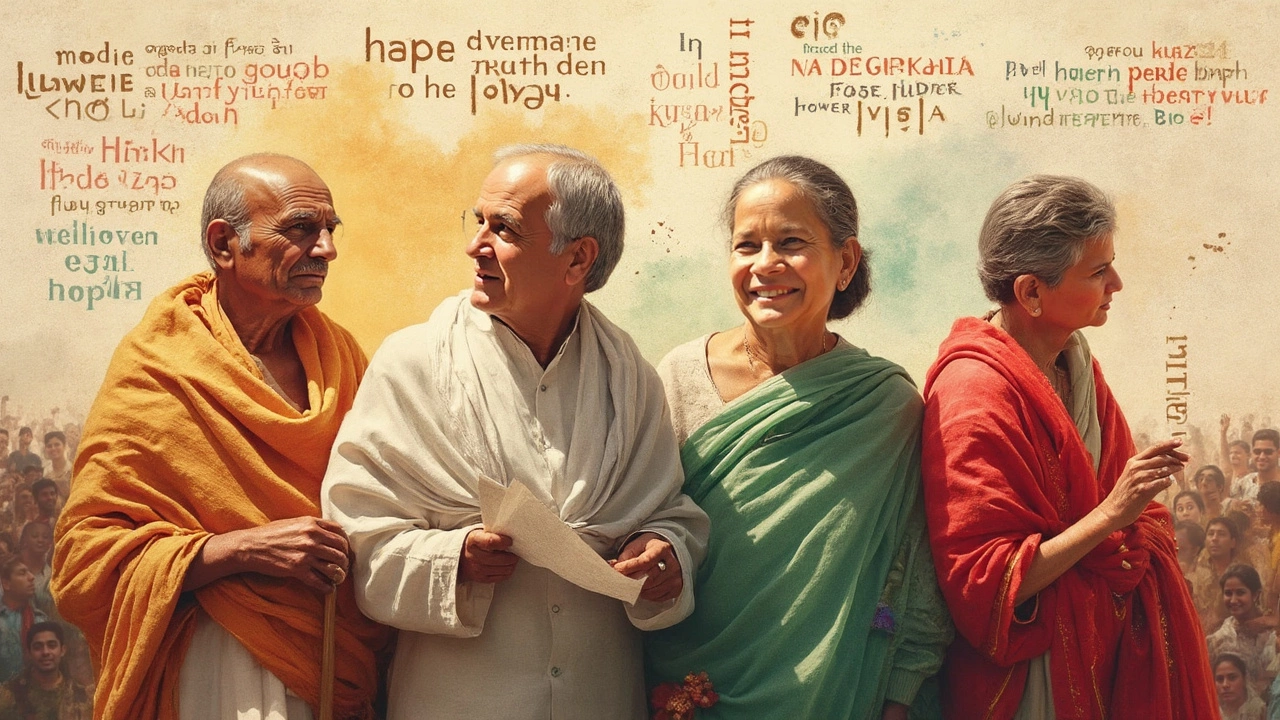Inspirational Quotes from Indian Leaders: Real Words, Real Impact
 Jun, 22 2025
Jun, 22 2025
When you think of famous quotes, do you picture school textbooks and dull speeches? It's wild how much power a few simple words can hold. Indian leaders, like Gandhi or Dr. Kalam, never just spoke for show—their words hit home because they lived by them. Why do their quotes still spread on WhatsApp or pop up on walls and phone screens across the country? Because they're raw, relatable, and drop the kind of truth you keep coming back to.
Ever noticed how a solid quote can snap you out of a rut or give you a weird burst of energy? That's not some accidental magic. Leaders in India have a style—they keep it plain, but load their lines with pure intent. Whether you're hustling on a Monday or facing a family drama, their wisdom sticks around. I'll show you exactly where these sayings came from and, more importantly, how they've become tools, not just nice words.
- Why Indian Leaders’ Quotes Still Matter
- The Stories Behind Iconic Quotes
- Applying These Quotes to Your Life
- Tips to Keep Inspiration Alive Daily
Why Indian Leaders’ Quotes Still Matter
It's not just nostalgia—quotes from Indian leaders stick because they’re packed with real-life experience and punchy advice. There's proof in numbers. According to a 2023 online survey by LocalCircles, about 68% of young Indians say they've shared a quote from a leader like Mahatma Gandhi or Dr. A.P.J. Abdul Kalam on social media or with friends. These words aren’t just old lines—they're handed down as practical tools for motivation.
Think about "Be the change you wish to see in the world" by Gandhi. That line pops up everywhere: protest signs, office boards, even WhatsApp statuses. Why? Because it's direct, easy to remember, and hits you every time life feels stuck. Dr. Kalam's "Dream, dream, dream. Dreams transform into thoughts and thoughts result in action" is quoted in graduation speeches and business meetings, not because it's poetic, but because it’s a clear call to take action.
Here's a quick look at where you’ll most likely see these inspirational quotes India leaders use, in real life:
- Classrooms: Teachers use them to explain life lessons
- Public speeches: Politicians and CEOs keep them handy to spark action
- Social media: People tag quotes for daily motivation
- Homes: Posters and calendars feature classic sayings
Want to know just how far these words travel? Check this out:
| Leader | Most Shared Quote (2024) | Common Use |
|---|---|---|
| Mahatma Gandhi | “Be the change you wish to see in the world.” | Protests, schools, digital art |
| Dr. A.P.J. Abdul Kalam | “Dream, dream, dream. Dreams transform into thoughts and thoughts result in action.” | Graduation speeches, job portals |
| Swami Vivekananda | “Arise, awake and stop not till the goal is reached.” | Sports events, study groups |
Even major Indian startup founders say lines by these leaders inspire their teams. For example, Byju Raveendran (founder of BYJU’S) often mentions Kalam’s take on dreams in team meetings, especially when trying to shake off failures or push through tough launches.
If you’re looking for real talk that actually moves you to do something, this old-school inspiration still works—because it proves itself, again and again, in modern life.
The Stories Behind Iconic Quotes
Everyone’s seen at least one of Gandhi’s lines floating around: “Be the change that you wish to see in the world.” Sounds good, right? But it actually came from the way Gandhi handled daily life. He didn’t just ask folks to protest British rule; he lived the fight, boycotting products and leading marches. That quote’s not just about big, heroic moves—it’s about making tiny choices every day that add up.
Now, let’s talk about Dr. APJ Abdul Kalam. His words “Dream, dream, dream. Dreams transform into thoughts and thoughts result in action” were more than pep talk. He grew up selling newspapers on the streets of Rameswaram. He kept saying this to students to push them to think beyond their small towns or marksheets. That mindset turned him from a regular kid into the ‘Missile Man’ and the President of India. The way his story plays out, you realize it’s not just about wishing for things; it’s about backing up your dreams with hard work.
Indira Gandhi had a quote that sticks with anyone who’s juggled criticism: “You cannot shake hands with a clenched fist.” She dropped this line during some pretty tense negotiations. The point? You need to approach problems—big or small—with a bit of openness. When you see that quote in history books, it’s a reminder that stubbornness rarely solves anything.
Bhagat Singh, the freedom fighter, got real about purpose with “They may kill me, but they cannot kill my ideas. They can crush my body, but they will not be able to crush my spirit.” Even facing execution, he believed ideas outlive people. His line shows why passion counts for more than just guts; it's about leaving something behind for others to pick up, which explains why his quotes still fire up movements today.
In all these cases, these inspirational quotes India aren’t random words on posters—they’re gut-level lessons born out of real-life moments. Give them a read, think about the story behind the line, and they hit way harder.

Applying These Quotes to Your Life
Most of us read a quote, feel good for five seconds, then move on. But these lines from Indian leaders? They work best when you plug them right into your day. Take Dr. A.P.J. Abdul Kalam’s "Dream, dream, dream. Dreams transform into thoughts and thoughts result in action." He wasn’t just talking about sleeping at night—he meant set a goal, write it down, and break it into small steps. That’s how he went from a tiny town to launching rockets for ISRO.
Here’s a quick look at how people actually use these famous sayings in India to build real habits:
- Students use Gandhi’s line, "Be the change you wish to see in the world," as a daily reminder to start small—recycling or even just helping a classmate.
- Startups pin Kalam’s quotes in their offices to push the team during tough launches or product flops.
- Many folks facing family pressure use Swami Vivekananda’s, "Arise, awake and stop not till the goal is reached," to keep their motivation high during exams or career switches.
It sounds simple, but tracking these little wins actually matters. Here’s why: According to a 2023 study from the Indian Institute of Management, people who used quotes in their daily journaling routines reported feeling 27% more motivated to try new things at work or school. It beats scrolling for a quick boost that fades.
| Leader | Quote | Common Use |
|---|---|---|
| Mahatma Gandhi | "Be the change you wish to see in the world" | Encouraging personal responsibility |
| Dr. APJ Abdul Kalam | "Dream, dream, dream..." | Goal setting in education, business |
| Swami Vivekananda | "Arise, awake..." | Pushing through setbacks |
| Jawaharlal Nehru | "The policy of being too cautious is the greatest risk of all" | Startup risk-taking |
Want to actually make these words work for you? Try this:
- Pick a inspirational quote India that hits home, write it where you’ll see it every day—maybe on your phone wallpaper or near your bathroom mirror.
- When you’re stuck, ask yourself, “How would this leader act in my shoes?” No kidding, it works for small stuff like getting out of bed or bigger moves like changing jobs.
- Share the quote in a group chat or at work—when others catch the spark, it actually keeps you accountable.
That’s how these classic lines go from fridge magnets to honest tools for your hustle.
Tips to Keep Inspiration Alive Daily
Getting inspired is great, but keeping that energy up every day? That’s the real challenge. If you want the vibe from inspirational quotes India to stick with you long after you read them, a few practical hacks can help.
- Pin Your Favorite Quotes Where You Can See Them: It sounds basic, but it works. Put sticky notes on your mirror, make one your phone lock screen, or hang a poster above your desk. A study by the University of Scranton found that people who wrote their goals or reminders somewhere visible were 33% more likely to stay on track.
- Start a Small Routine: Make it a habit to read one quote each morning. Just a minute or two. Over time, your mind will get used to kicking off in a positive direction, sort of like brushing your teeth.
- Relate Quotes to Your Own Life: Don’t just glance and scroll on. Pause and tie the quote to what’s bugging you or what you’re working on. For example, if you’re facing criticism, Nehru's line "Failure comes only when we forget our ideals" can remind you not to lose focus.
- Share It With Others: Share a cool quote with your friends or family. People who discuss motivational ideas, even in quick chats, are much more likely to act on them. If you have a work group chat, toss a quote in on a rough Monday—sometimes, it starts a much-needed conversation.
- Remind Yourself of the Backstory: Quotes are more than just words. Whenever you read one, look up the tiny story behind it. For instance, Gandhi’s “Be the change you wish to see in the world" was meant to nudge people to act, not just wait for a miracle. The real meaning can give that quote a boost in your real life.
Just for fun, here’s a quick look at how different inspiration tools stack up in a simple table:
| Method | How Often Used (India, 2024) | Self-Reported Benefit |
|---|---|---|
| Physical Notes (stickers, posters) | 56% | Easy daily boost |
| Phone Wallpapers | 70% | Quick reminders on the go |
| Group Sharing (WhatsApp, Slack) | 62% | Higher motivation through teamwork |
Little habits add up. If you weave these tricks into your daily routine, quotes from Indian leaders can actually shift your mindset for the better. Don’t just admire the wisdom—use it as a real tool, one day at a time.